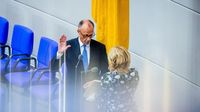Friedrich Merz has been elected Germany’s chancellor in a second round of parliamentary voting after experiencing a historic defeat in the first attempt. This unprecedented event marked the first time since World War II that a candidate for chancellor failed to secure a majority on the first ballot. On Tuesday, May 6, 2025, Merz garnered 325 votes in the second round, surpassing the required majority of 316 in the 630-seat Bundestag. His initial attempt yielded only 310 votes, leaving him short of the 328 seats held by his coalition, which includes the Christian Democratic Union (CDU), the Christian Social Union (CSU), and the Social Democratic Party (SPD).
Following the vote, the 69-year-old Merz proceeded to Bellevue Palace to be formally nominated by President Frank-Walter Steinmeier. He is set to return to the historic Reichstag building in Berlin to take the oath of office, officially becoming Germany’s 10th chancellor since the end of World War II. The CDU/CSU alliance emerged victorious in the national elections held in February 2025, securing 28.5 percent of the vote.
On May 5, 2025, the CDU/CSU coalition reached an agreement with the SPD, which had received 16.4 percent of the vote following the collapse of Olaf Scholz’s government last year. This coalition aims to revive economic growth through initiatives such as reducing corporate taxes and lowering energy prices. Additionally, it promises robust support for Ukraine in its ongoing conflict with Russia, alongside plans for increased military spending.
Despite the coalition's ambitions, Merz’s failure to gain parliamentary backing in the first round raised concerns about the unity of the governing parties. Al Jazeera’s Dominic Kane reported from Berlin, noting that this initial setback suggests “all is not well in those three … now governing parties.” Experts have expressed that this embarrassment could hinder Merz’s ability to lead effectively, especially as he has pledged to restore Germany’s leadership on the global stage.
Jana Puglierin, head of the Berlin office of the European Council on Foreign Relations, remarked, “The whole of Europe looked to Berlin today in the hope that Germany would reassert itself as an anchor of stability and a pro-European powerhouse.” However, she noted that this hope has been dashed, with potential consequences extending beyond Germany’s borders.
Moreover, the political landscape in Germany is becoming increasingly fragmented, with the far-right Alternative for Germany (AfD) party gaining traction. The AfD is now the largest opposition party in the new parliament, having placed second in February’s elections. Following Merz's initial defeat, AfD co-leader Alice Weidel criticized the coalition as having a “weak foundation,” calling for fresh federal elections and suggesting that Merz should resign.
Merz’s coalition faces additional challenges, including rising tensions in Europe and the ongoing war in Ukraine. As the second-largest supplier of military aid to Ukraine after the United States, Germany’s role in the conflict is critical. Ukraine’s President Volodymyr Zelenskyy expressed gratitude for Germany’s support, stating, “Ukraine is deeply grateful for the support of Germany and its people.” He also called for more European and transatlantic leadership from Germany.
In the realm of defense, Germany ranks fourth in global military spending, according to the Stockholm International Peace Research Institute. This ranking has been bolstered by a significant investment of 100 billion euros ($107 billion) for the armed forces, a measure passed by lawmakers in 2022. The urgency of increasing defense spending has been underscored by pressures from the Trump administration, which has criticized Germany’s commitment to NATO and European security.
After the first ballot, the DAX, Germany’s stock market index, fell by 1.8 percent, reflecting the uncertainty surrounding Merz's leadership. Despite the initial defeat, designated Foreign Minister Johann Wadephul remained optimistic, stating, “It is an annoying process, but in a parliamentary democracy, in a liberal country, this is unfortunately one of the scenarios that you have to be prepared for.”
Merz’s leadership style has faced scrutiny, with critics labeling him as elitist due to his corporate background and blunt demeanor. His previous tenure as the head of the German branch of BlackRock has led to accusations of disconnect from ordinary citizens. Additionally, his controversial comments regarding migration have sparked backlash, particularly after he sought to tighten immigration enforcement with the support of the far-right AfD.
As Merz prepares to take office, he must navigate a complex political landscape marked by rising populism and a shifting relationship with the United States. The Trump administration has repeatedly criticized Germany since taking office, and tensions have only escalated. Vice President JD Vance has openly criticized the mainstream parties’ refusal to cooperate with the AfD, further complicating the political dynamics.
The challenges facing Merz are not solely external; he must also contend with the internal divisions within his coalition. Political analysts have warned that the initial voting debacle could weaken his governing agenda and complicate efforts to implement policies aimed at revitalizing the stagnant German economy.
As Merz steps into his role, the eyes of Europe and the world are on Germany, hoping for stability and leadership amid ongoing global challenges. The next few months will be critical for Merz as he seeks to solidify his coalition and address the pressing issues facing the nation.





